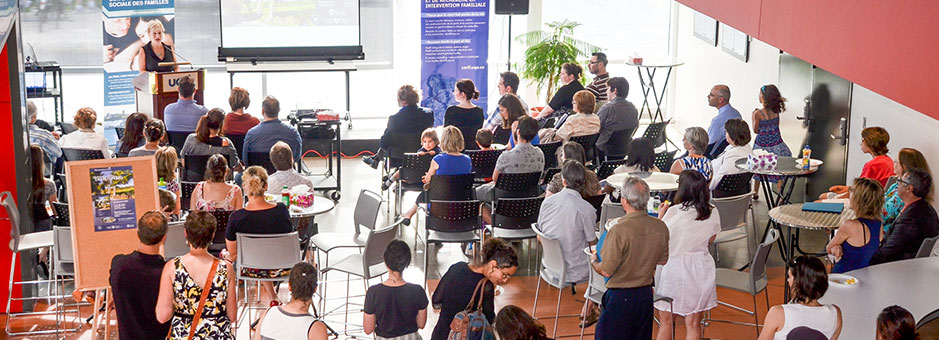The Canada Research Chair in Family Psychosocial Health and the Centre for Studies and Research on Family Health Intervention have several partnerships that enable them to conduct their research projects.
Father Friendly Initiative within Families (FFIF)
The mission of the Father Friendly Initiative within Families (FFIF) is to promote fathers’ engagement with children, within families and communities. To achieve this, the program supports the healthcare, social services, and community network working with parents and children within the designated territory. The FFIF provides guidance to managers and care providers on innovative and effective interventions for fathers and their families. The promotion of paternal engagement is seen as a determining factor for the health and development of children, fathers, mothers, and families.
- Avenir d’enfants
- Agence de santé des Laurentides–Lanaudièresand health and social services centres (CSSS) of these regions
- Agence de santé de l’Outaouais and the CSSS of the region
- Association pour la santé publique du Québec (ASPQ)
- Association québécoise pour la santé mentale des nourissons
- Association canadienne des infirmières et infirmiers en périnatalité et en santé des femmes – Canadian Association of Perinatal and Women’s Health Nurses (CAPWHN)
- Centre hospitalier universitaire Sainte-Justine
- CSSS de Vaudreuil-Soulanges
- CSSS de Brome Missisquoi
- CSSS de Laval
- Centre for Studies and Research on Family Health Intervention (CÉRIF), a research centre supported by the Université du Québec en Outaouais (UQO) and the Intact Foundation
- Research Group on Men’s Mental Health during the Postnatal Period and Primary Care Practices,a research team funded by the Fonds de recherche en santé du Québec (FRSQ)
- Centre d’études interdisciplinaires sur le développement de l’enfant et la famille (CEIDEF) at the Université du Québec à Trois-Rivières (UQTR)
- Regroupement pour la valorisation de la paternité (RVP)
Miscarriage in the Emergency Room project [Projet Fausse couche à l’urgence]
We have little knowledge regarding the medical and nursing services provided to women and their spouses who experience a miscarriage in the emergency room, just as we have little idea how community counselling resources care for them after their emergency room visit. Likewise, we do not know the experiences of emergency room teams providing care for miscarriage cases.
To fill this knowledge gap, our research team is currently conducting a survey among healthcare practitioners, emergency room managers, and parents in nine regions of Quebec. Interviews will also be conducted with parents and practitioners.
Our objective is to identify best practices for ensuring continuity of care between the hospital and community resources. The knowledge gained from this study will help make available a continuum of primary care services that effectively address the needs of women and their spouses.
- Association des gestionnaires infirmiers d'urgence du Québec
- Association des infirmières et infirmiers d'urgence du Québec
- Centre hospitalier Saint-Eustache
- Centres de santé et de services sociaux (CSSS) de Gatineau
- Centre de recherche du Centre hospitalier affilié universitaire Hôtel-Dieu de Lévis (CHAU)
- Parents Orphelins
- Université du Québec en Outaouais (UQO)
- Université du Québec à Rimouski (UQAR)
- Université Laval
Assisting Fathers in Mourning Following the Death of an Unborn Child –Movember Project
It is estimated that 20% of pregnancies terminate in spontaneous abortion (commonly called a miscarriage) within the first twenty weeks of pregnancy and that 11,000 babies per year die in the perinatal period (i.e. from the 28th week of pregnancy to the 28th day of life) (Statistics Canada, 2008). In Quebec, closer to 21,000 pregnancies end in perinatal death.
Despite such high prevalence, bereavement for perinatal death has always received less attention than in the case of other kinds of death. Moreover, it is clear that, despite healthcare workers’ best intentions, men’s bereavement as fathers remains for the most part invisible and is rarely treated by professionals in the healthcare system or elsewhere. Practitioners feel that supporting parents in bereavement is demanding and they have expressed the need for training.
To respond to these various needs, this project will be implemented over the next two years in the National Capital (Gatineau-Ottawa), Laurentides (CSSS de St-Jérôme), and Montreal regions. Three groups (one per implementing site) of 7 to 10 men will validate caregiving strategies for counselling following perinatal death that were identified in the course of research conducted by the Research Group on Men’s Mental Health during the Postnatal Period and Primary Care Practices
A discussion workshop with 6 groups of 25 practitioners and managers from various disciplines will also be held to support establishment of best practices for fathers in bereavement.
- Movember Canada
- Canada Research Chair in Family Psychosocial Health
- Research Group on Men’s Mental Health during the Postnatal Period and Primary Care Practices
- Centre for Studies and Research on Family Health Intervention (CÉRIF)
- Centre d’Études Interdisciplinaires sur l’enfant et sa famille (CEIDEF)
- Regroupement pour la valorisation de la paternité (RVP)
- CLSC de Hochelaga-Maisonneuve
- CSSS de Saint-Jérôme (Laurentides)
- CSSS de Gatineau (Gatineau)
- Programme régional de soins à la mère et l’enfant de Champlain (Ottawa)




